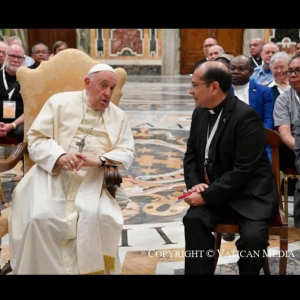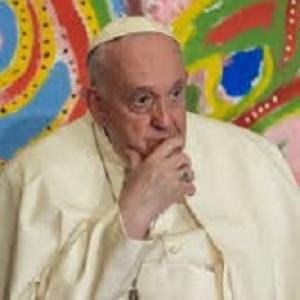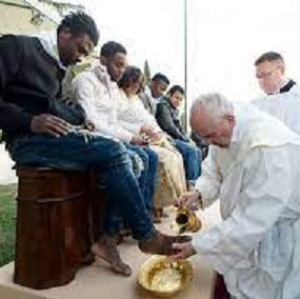Displaying items by tag: Pope Francis
Chapter audience with Pope Francis. And text of his address.
Chapter audience with Pope Francis. And text of his address.
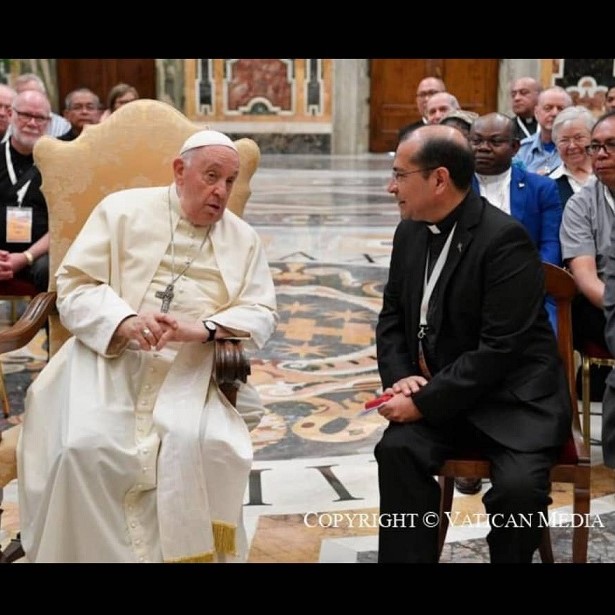
And a range of photos -with thanks to various sites and Facebook pages.
And a note. The Vatican text in English says Laymen of the Chevalier Family – dear oh dear!! And it is their title now which says Missionaries of the Sacred Hearts.
We include the whole address for those who would like to download it.
ADDRESS OF THE HOLY FATHER FRANCIS TO THE PARTICIPANTS OF THE GENERAL CHAPTER OF THE MISSIONARIES OF THE SACRED HEARTS Clementine Hall, Monday, 2 October, 2023

Dear Brothers, good morning and welcome!
I greet the Superior General and all of you at this meeting, which is taking place during the 26th General Chapter of your Institute.
On 8 December 1854, Father Jules Chevalier founded the Missionaries of the Sacred Heart of Jesus in Issudun, France, a foundation that would be followed in time by those of the Daughters of Our Lady of the Sacred Heart and the Missionary Sisters of the Sacred Heart, joined by lay associates, known as the Laymen of the Chevalier Family.
From the beginning, he thought of you as missionaries, committed to making God's love
known in the world in order to obtain from men a response of love. And it is beautiful, in this
perspective, that you have chosen to be guided on the path of the Chapter by the Gospel
pericope of Emmaus (cf. Lk 24:13-35). We can derive three fundamental attitudes from it, to
reflect on your charismatic identity and your missionary commitment: to know the Heart of
Jesus through the Gospel; to deepen its message in fraternal sharing; to proclaim it to all in
the joy of mission.
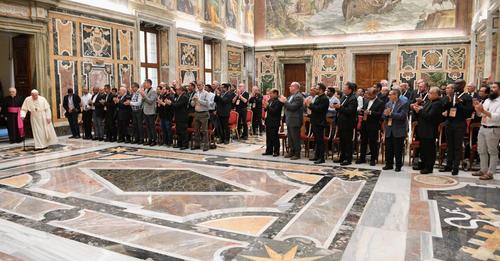
First: to know the Heart of Jesus through the Gospel, that is, by meditating on His life. It is
there, in fact, that He continues to make Himself our travelling companion (cf. vv. 25-27). Fr
Chevalier liked to define the Gospel as the book "of the Sacred Heart", while inviting
everyone to contemplate in it the charity with which the Saviour allowed Himself to be
touched by all poverty, happy to pour out the tenderness and compassion of His Heart on the
little ones and the poor, the suffering, sinners and all the miseries of humanity. Moreover, the
explanation of the Scriptures that Jesus offers to the disciples of Emmaus along the way is not
theoretical: it is the direct testimony of the One who fulfilled what he is talking about, loving
the Father and his brothers and sisters to the cross, receiving in his flesh the wounds of the
nails and allowing his Heart to be pierced for pure charity. The Risen One, who makes
Himself known in the breaking of the Bread, is the One who conquered death by giving life,
who showed mankind the Father's love by loving them without measure with His divine and
human Heart, and who therefore knows how to speak words that make the breast burn! This is
how one gets to know the Heart of Jesus: by contemplating in the Gospel his immense mercy,
like Mary, whom you venerate under the title of "Our Lady of the Sacred Heart" and who
knows how to show us the Heart of her Son precisely because "she kept these things
pondering them in hers" (Lk 2:19). This then is the first invitation:
to know the Heart of Jesus by meditating on the Gospel. And on this, do not be afraid of
silence, do not be afraid!

For this strong experience to become light for the journey, it must also pass through the
enrichment of sharing. Here is the second element: deepening and understanding the Word in
fraternal sharing. At Emmaus, the disciples, immediately after recognising Jesus, ask each
other in amazement what they had experienced (cf. v. 32). It is an invitation also for us to
make a gift to one another of the wonder that is born in the heart when one encounters the
Lord. Before meeting him, the two companions discussed failures and disappointments,
afterwards they rejoice at having seen the Risen One! Sharing was also important in Fr
Chevalier's life. In the seminary, he passed on his fervour and his dreams to some sensitive
companions, whom he used a play on words to call the knights (chevaliers) of the Sacred
Heart. And it was in meeting one of them again after years of distance, animated by the same
zeal, that he saw the long-awaited sign to begin the foundation. Therefore, in the work of this
Chapter, as in the ordinary discernment of your communities, I invite you too to always put
fraternal sharing of your encounter with Christ, in the Word, in the Sacraments and in life, at
the basis of everything and before everything else. You will then be able to address even the
most pressing problems constructively. Sharing among yourselves.
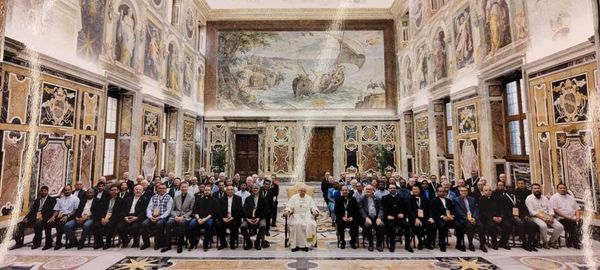
And we come to the last aspect: the joyful proclamation in the mission. The disciples of
Emmaus leave without delay, return to Jerusalem and tell what has happened (cf. vv. 33-35).
You have chosen as a motto for your chapter work the words: 'from ego to echo', that is, from
self to common home, to family, to community, to creation. It is a strong expression and a
commitment for your future, especially for discernment about new types of ministry to which
you should open yourselves. There is no shortage of challenges: witness the Martyrs of your
congregation and the many areas of charity in which you have already been called to work on
all continents. The poor, the migrants, the many miseries and injustices that continue to renew
themselves in the world urgently question us. Faced with them, do not be afraid to allow
yourselves to be caught up in the compassion of the Heart of Christ; as your Founder said,
allow him to love through you and to manifest his mercy through your goodness. And do this
with courage, as he did - for example, when he accepted the mission in Melanesia and
Micronesia, albeit with limited strength - allowing the irresistible tenderness of the Sacred
Heart to shape, modify and even upset, if necessary, your plans and projects. Please do not be
afraid of tenderness! God's style can be said in three words: closeness, compassion and
tenderness. God is like that: close, compassionate, tender. Be like this with others. But this
closeness, this compassion, this tenderness you will receive in dialogue with Jesus. Prayer is
so important to bring this about. Without prayer, things do not work, do not go.
Thank you, dear brothers, for what you are and what you do! Continue your work with
enthusiasm. Flee from sadness, which is the cankerworm that ruins personal and consecrated
life! That sadness that brings you down, not the good sadness of repentance, that is another
thing, but that daily sadness is a woodworm that ruins. I bless you from my heart. And I
recommend t h a t y o u pray for me, because I need it, this work is not so easy! Thank you.
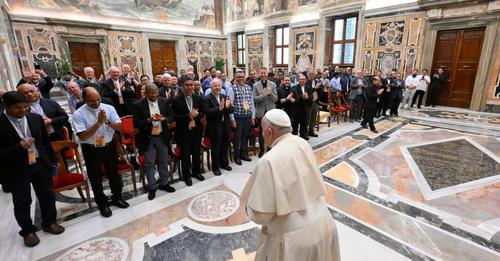
Some recent observations by Pope Francis on stances in the Church – and on what he has called ‘backwardism’
Some recent observations by Pope Francis on stances in the Church – and on what he has called ‘backwardism’
With the first session of the Synod in Rome coming closer, opposition is increasing, especially in the US. Here are some provocative statements and some photos from Pope Francis.
Quotes:
I want to remind that backwardism is useless, and it is necessary to understand that there is a correct evolution in the understanding of questions of faith and morals.
And instead of living by doctrine, by the true doctrine that always develops and bears fruit, they live by ideologies, But when you abandon doctrine in life to replace it with an ideology, you have lost, you have lost as in war.
If you don't change upward, you go backward, and then you take on criteria for change different from those that the faith itself gives you to grow and change. And the effects on morality are devastating.
Those who today always look for disciplinarian solutions, those who long for an exaggerated doctrinal 'security,' those who stubbornly try to recover a past that no longer exists - they have a static and inward-directed view of things. In this way, faith becomes an ideology among other ideologies.
What I don’t like at all, in general, is that we look at the so-called ‘sin of the flesh’ with a magnifying glass. If you exploited workers, if you lied or cheated, it didn’t matter, and instead relevant were the sins below the waist.
The door is open to everyone, everyone has their own space in the church, How will each person live it? We help people live so that they can occupy that place with maturity, and this applies to all kinds of people.
Preparing for the General Chapter – Pope Francis on an important perspective
Preparing for the General Chapter – Pope Francis on an important perspective

“Spiritual worldliness” a great danger to Church and its priests (and all of us)
Spiritual worldliness is one of the most dangerous temptations facing priests and the Church because it “reduces spirituality to appearance” while disconnecting it from the Gospel, Pope Francis has warned. Source: CNA.
“[Spiritual worldliness] leads us to be ‘workers of the spirit,’ men clad of sacred forms that actually continue to think and act according to the fashions of the world,” the Pope wrote in a letter to the priests of Rome, released yesterday.

The Pope’s message was dated August 5, the memorial of the Dedication of the Basilica of St Mary Major in Rome. The Pope is the bishop of Rome and wrote the letter to provide what he described as the comfort of a “fraternal encounter.”
In his comments on spiritual worldliness, the Pope drew heavily from the reflections of 20th-century theologian and cardinal Henri de Lubac, who wrote that the invasion of spiritual worldliness into the life of the Church would be “infinitely more disastrous than any simple moral worldliness” because spiritual worldliness “corrupts [the Church] by undermining her very principle.”

Pope Francis wrote that spiritual worldliness begins to take hold in the lives of priests not only through temptations to mediocrity, power and influence, and vainglory but also “from doctrinal intransigence and liturgical aestheticism,” which have the appearance of religiosity and even loving the Church but instead seek human glory and personal well-being.
The Pope also took the occasion to address more deeply one of his perennial concerns, clericalism, which he described as a “specific form” of spiritual worldliness. Pope Francis wrote that clericalism falsely gives the impression that priests are “superior, privileged, placed ‘high’ and therefore separated from the rest of God’s holy people,” which the Pope said denotes “an illness that makes us lose the memory of baptism we have received”.

